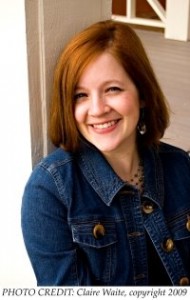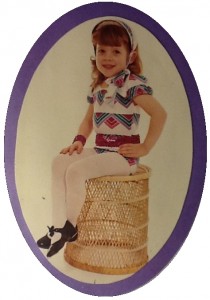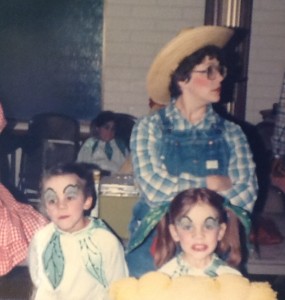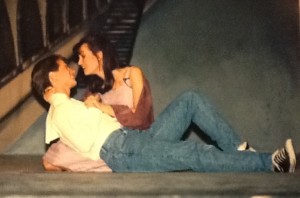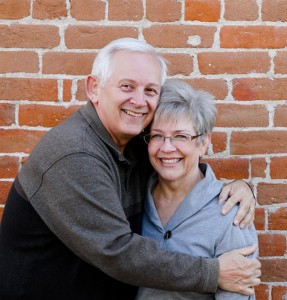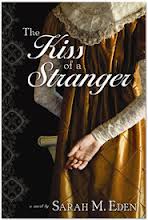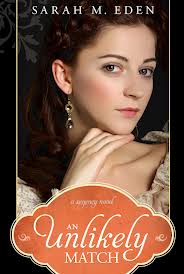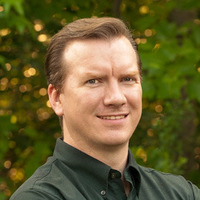Happy Halloween! While all of you are out either preparing for trick-or-treaters or getting your costumes finalized to go do it yourself, I am happily tucked away at the Rosario Marine Beach Lab for a wonderful 3-day Writer’s Retreat (the ANWA Northwest Writer’s Retreat). If you’re LDS, a woman, and you like to write, check out this retreat for next year.
In the meantime, it’s that day of the week again and I have another terrific writer to unpeel before your very eyes (not that I’m comparing her to an onion, mind you, but all writers have layers, I’ve found . . . Let’s consider her a sweet onion of the variety grown nearby in Walla Walla, Washington). :D
I first met Sarah M. Eden when we both took part in a self publishing panel discussion at the LDStorymakers Writers Conference back in 2009. As it turned out, she and I were Whitney finalists that year, along with another member of the panel–Joyce DiPastena. Since then, she’s gone on to be traditionally published, has an agent, and has become a must-have emcee at that very same writer’s conference. Oh, and by the way, she joined us up here near Deception Pass as our Writer in Residence for last year’s retreat!
Now let’s start pulling back the layers.
Me: How old were you when you first realized the power of humor, and please describe the circumstances of that discovery? (And I’d love a picture of you at that age.)
Sarah: I can’t remember a time when humor wasn’t a defining character trait of mine. It probably began in the womb–no, I don’t have a photo of that. (What? No ultrasound? Drat!)
My entire family is funny. Family dinners involved as much laughter as eating. The time an entire cooler of ice water spilled in the back of the minivan, the Noah’s Flood jokes went on for hours. Weeks. Okay, we actually still joke about it. My sister and I once spent an entire afternoon acting out a parody of the first two Twilight movies for our sister-in-law, complete with props and costumes, simply because it would be funny. (And you didn’t videotape it for YouTube? Have you thought about reprising it for a conference? Hint, hint.) My youngest brother was once attacked by a dog, leading to stitches and the services of a plastic surgeon. We responded in the usual way . . . a care package of doggy chew toys, kibble, and a greeting card that played “Who Let the Dogs Out.”
That’s just how we roll.
(Something tells me it’s genetic, too. Her daughter’s going to be just like her.)
Me: Not counting “The Sun,” which you wrote at age 5 (and it sounds like it may have been one of those Kindergarten school assignments), what was the gist of the very first story you ever wrote (“The Mystery of the Broken Unicorn”), and do you still have it? Any plans to rewrite it?
Sarah: Do I still have it? Do you doubt I would hold on to such a piece of literary mastery?! Of course I still have it. One might classify this magnificent story as a Middle Grade Fantasy. One might also classify it as horrible. One would be right on both counts. (Notice the voice change here? She’s definitely in her Regency voice.)
I begin the book by making note of the fact that the “pictures & words” are by me. That’s how you know you’re about to get quality. The story tells of a young girl whose mother has a glass unicorn on her dresser that the girl should “NEVER touch, no matter what.” So the girl, of course, touches it, and it puts a spell on her. That is the point where I wrote The End. No, really. That’s where I ended it. I didn’t know what to do next so I figured just calling it quits was the best option. (A very quick read…but a promising beginning.)
Me: Okay, why did you choose Social Science Research as a major when it’s apparent your true loves are literature and history? In other words, who convinced you to be practical?
Sarah: I chose Social Science Research because it was fascinating. My emphasis was the impact of mass communication on societies, with focus on the role of emerging social media. My thesis, get this, hypothesized that emerging social media (this was in 2000) would be used to create virtual communities. *insert evil genius laugh here* Essentially, I predicted Facebook and Twitter. Someone owes me big bucks! (Well, when you put it that way…as Rosanne Rosanna Danna would say, “Never mind.”)
I still find research, be it historical, social, statistical, etc., endlessly enthralling. I love when pieces fall into place and a mystery begins to make sense. I get all giddy when I learn something new, especially something obscure. *insert evil genius laugh here*
Short answer: I’m an evil genius.
(And the Princess of Prescience!)
Me: What was the basic plot of the short story for which you won 1st prize in the 2007 City of Glendale Short Story Competition? Any chance you’ll lengthen any of your short stories into novels?
Sarah: Actually, I absolutely love that short story. I think it is one of the best things I’ve ever written. I have pondered many times expanding it into a full-length book, but the timing just hasn’t been right. Maybe some day. *sighs dramatically*
The story is about a 3rd Grader with a gambling addiction. No, it’s not an after-school-special type of moralizing book. It’s actually hilarious. And the main character is fantastic. (If I do say so myself.) (Hmmm…have we accidentally uncovered a layer from the author’s own past?)
Me: After having seen both you and your husband “act” in “film,” I have to assume you both have experience in theater. Am I correct? If so, please provide details (and pictures).
Sarah: We have both spent quite a lot of time on the stage. I began my “career” playing a dead plant in a church roadshow, followed by an unemployed elf in the 6th grade Christmas play.
Junior High School saw me placed in the oh-so-glamorous position of pretty much everybody’s understudy. By High School, I had moved up in the world, playing a 5-year-old boy (Tiny Tim, A Christmas Carol), a 7-year-old girl (Marta Von Trapp, The Sound of Music), and eventually graduating to a teenager in Hello, Dolly! and Fiddler on the Roof. I found myself typecast as Hermia in A Midsummer’s Night Dream (for those of you keeping track at home, she’s the character who spends the entire play as the butt of everyone’s short jokes).
My husband did a lot of acting in High School, as well. He was in Taming of the Shrew and Cheaper By the Dozen, among others. He was dreamy Tony in West Side Story and played Sherlock Holmes in a community theater production.
He has the look of a lead and the skills to get the job done. I was always a sidekick. A short sidekick. Or a child. But I’m not bitter. (Much.)
(Yeah, but who’s getting all the attention now? Am I right? Good things come to those who wait, no matter their size. :D)
Me: Do you really have, as you put it in an interview with Donna Hatch, “a contraption made up of very large books, packing tape and the back of the sofa in my living room which allows me to type while spending some quality time with my elliptical machine while burning calories to which I’d rather not become too permanently attached”? (You said then that you’d rather not provide a picture, but I DO require a picture of your true writing space…as well as a description of it in either Regency terminology or in the voice of one of your children…please.)
Sarah: The contraption changed a little last year when we replaced our couch. Fortunately, when you MacGyver a write-while-exercising-stand, it tends to be adaptable. The current incarnation involves a packing box, a wooden cutting board and a book of Broadway ballads arranged for the piano. Here is the catalog entry I am preparing for when I sell it and make my millions:
Do you have Writer’s Butt? Is your backside expanding with every rewrite? Does drafting your newest book get in the way of burning those extra pounds?
Introducing the ‘Tend to Your Deadline and Your Waistline’ computer stand. Finally, a contraption that meets the lazy writer’s needs. Exercise while you type and look good doing it!
(So where’s the picture?)
What? You want a picture? Sorry. I don’t give out that kind of classified information–not until the patent is secured.
(Okay, what happened to the description in the voice of a Regency romance…or one of your children? Hmmm…I guess this is one writer’s lair that will remain secret in every sense…except…she let slip a clue on Facebook, so I think it’s only fair to share. Here’s a look at her plotting board.)
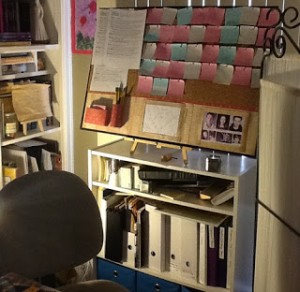 Aha! Part of her secret office.
Aha! Part of her secret office.
(If you want the details behind the colorful board, you’ll have to check out her posting on her website here.)
Me: You’ve also said that “writing requires a certain degree of mental instability.” How so? (And I mean this in all seriousness, as I’m most curious about the writer’s mind.)
Sarah: Most people consider hearing voices in their head a reason to be concerned. Writers think of it as a running narrative for the scene they are writing.
A normal person would never think a fictional character of their own creation could argue with them, defy their orders, or make their own decisions. Writers embrace this without batting an eyelash.
Most people, if they wake up in the middle of the night with a random idea running through their mind, grumble a bit, roll over, and go back to sleep. Writers rush to write it down, unspeakable grateful to have finally worked through that sticky plot problem.
We pour our hearts and souls into a book we then willingly send out to the slaughter. We get rejected, criticized, ranked, Goodreaded (yes, that is now a verb) (In the same way as Amazoned?) and in many other ways alternately praised and excoriated, yet we keep going back for more rides on the pendulum of public opinion.
We are often insomniacs. We cry when we do horrible things to our characters even though we knew it was coming all along. We compare ourselves to Shakespeares and Miltons and then wonder why we never feel good enough. We can obsess over a single word for hours.
All of this and we love it anyway. This cannot be normal or entirely healthy. Mental Instability.
(Case closed.)
Me: Which parent had the most influence on you as a writer, and how? (It would be nice to show a picture of the influential parent here.)
Sarah: They both have influenced me. I couldn’t say one did more than the other. For the sake of answering the question, I’ll say that my mother is the one who first convinced me to seriously pursue writing.
I was sitting at her kitchen table bellyaching about how hard it was to find a sweet (think PG content) historical romance. I waxed long and irritated, likely using a great deal too much hyperbole. There may or may not have been references to the ridiculousness of so few sweet historicals on the shelf in light of all NASA’s accomplishments. My dear mother, rather than commiserate and accept my tendency toward dramatics, said, essentially, “So why don’t you write one yourself?”
So I did. And I gave her a spiral-bound copy of that first book for Mother’s Day the next year. The book? THE KISS OF A STRANGER.
Me: Which is more fun–research or writing? And why?
Sarah: It’s a toss-up. For me, the two are so intertwined I can’t entirely separate them. The historical context of my books is always a huge part of plot, character, etc. So the research determines what I write, and what I write directs my research. (Sort of like the chicken and the egg, eh?)
I set aside one day each week that is entirely for research . . . no writing (unless I’m on a deadline and don’t have a choice). Some of that is research for a specific project. Some of it is just me devouring history and learning new things. I have found so many ideas for new books, or ways to enrich stories I’ve already thought of, through a steady, consistent approach to research. (Thanks for the tip! I may just be revising my weekly schedule.)
Writing makes me a happy person. Truly. I get so excited when a storyline comes together, when the characters become real right before my very eyes. I put a lot of prep work into my books and there is something extremely satisfying in seeing weeks, sometimes months of planning turn into a story I can be proud of.
Also, I don’t like edits. I like having edited, because the book is always better. But I don’t like doing it. *bleh*
Me: Finally, what are you working on now, and how far down is your supply of Cheetos?
Sarah: Cheetos and I had to go our separate ways a couple years ago. Apparently, my stomach and Cheetos have a great animosity for each other. Hatred, pure and simple. I have not yet found an adequate replacement. In fact, I feel a little lonely now when I write. *wipes tear*
(By the way, am I the only one that’s noticed how attuned Sarah is to stage direction, sound effects, etc.? Something tells me she ought to give screenwriting a try.)
Right now I am working on the sequel to a romance novel my agent (Hi, Pam!) is currently shopping. It, along with Book 1, takes place in 1870 in Wyoming Territory amongst a group of Irish Immigrants sharing a valley with a group of settlers who absolutely despises the Irish. Against the backdrop of this percolating feud, our heroine finds her heart being pulled by two very different men, all while trying to sort out a lifetime of her own pain and regrets. In the words of my 9-year-old daughter, “This book is magically delicious.”
I am sure we’ll all agree once we finally get to read it. In the meantime, enjoy any of her others (SEEKING PERSEPHONE, COURTING MISS LANCASTER, FRIENDS AND FOES), including her latest: AN UNLIKELY MATCH.
And you can check out Sarah’s website here. I highly recommend her blog for reading that always entertains as well as informs.
Next week: J. Lloyd Morgan
Originally posted 2012-10-31 06:00:04.

